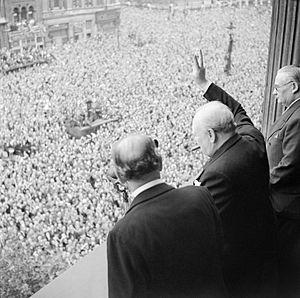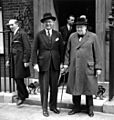Winston Churchill in the Second World War facts for kids
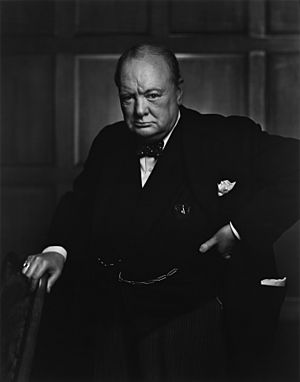
Winston Churchill was a very important British leader during World War II. He became the Prime Minister on May 10, 1940, and led Britain until July 26, 1945. Before the war, he had warned about the growing power of Nazi Germany and pushed for Britain to get ready for a fight. As Prime Minister, he guided Britain through the war against the Axis powers. Many people see Churchill as a hero who helped protect liberal democracy in Europe. He was one of the most important Allied leaders in the first part of the war.
Contents
- Churchill as First Lord of the Admiralty: September 1939 to May 1940
- Churchill as Prime Minister: 1940–1945
- Initial Reaction to Churchill as Premier
- War Ministry Created
- Resolve to Fight On
- Importance of Churchill's Wartime Speeches
- Operation Dynamo and the Battle of France
- The Battle of Britain and the Blitz
- Lend-Lease
- Operation Barbarossa
- Atlantic Charter
- Pearl Harbor to D-Day: December 1941 to June 1944
- Pearl Harbor and United States Entry into the War
- Problems in Parliament and the War Cabinet
- Fall of Singapore and Loss of Burma
- International Conferences in 1942
- Turn of the Tide: El Alamein and Stalingrad
- International Conferences in 1943
- Invasions of Sicily and Italy
- Preparations for D-Day
- Need for Post-War Reform
- Defeat of Germany: June 1944 to May 1945
- D-Day: Allied Invasion of Normandy
- Quebec Conference, September 1944
- Moscow Conference, October 1944
- Yalta Conference, February 1945
- VE Day and After
- Images for kids
Churchill as First Lord of the Admiralty: September 1939 to May 1940
When Britain declared war on Germany on September 3, 1939, Prime Minister Neville Chamberlain made Churchill the First Lord of the Admiralty. This meant he was in charge of the British Navy, a job he also had at the start of the First World War.
The Phoney War and the Norwegian Campaign
During a time called the "Phoney War" (when there wasn't much fighting on land), Churchill was a very visible leader. He was excited after the Battle of the River Plate in December 1939, where British ships fought a German warship. He also personally ordered a daring rescue of British prisoners from a German ship called the Altmark in Norwegian waters in February 1940. These actions made Churchill very popular.
Churchill was worried about German ships in the Baltic Sea. He planned to place mines in Norwegian waters to stop Germany from getting iron ore from Narvik. This plan was delayed until April 8, 1940, just one day before Germany invaded Norway.
The Norway Debate and Chamberlain's Resignation
The Allies failed to stop Germany from taking over Norway. Because of this, the British Parliament held a big debate from May 7 to 9. On May 8, the Labour Party called for a vote of no confidence in Chamberlain's government. Churchill had to defend the government, even though many people supported him.
Even though the government won the vote, its support was much weaker. On May 10, German forces invaded Belgium, Luxembourg, and the Netherlands. Chamberlain tried to form a new government with other parties, but the Labour Party refused to work under him. They said they would accept another Conservative leader. The two choices were Churchill and Lord Halifax. Halifax said he couldn't lead effectively from the House of Lords. So, Chamberlain advised the King to choose Churchill, who then became Prime Minister.
Churchill later wrote that he felt a deep sense of relief. He believed that his whole life had prepared him for this important moment.
Churchill as Prime Minister: 1940–1945
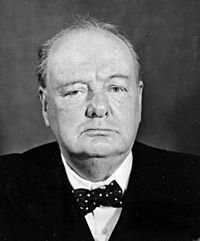 |
|
Quick facts for kids
First premiership of Winston Churchill
|
|
|---|---|
| 10 May 1940 – 26 July 1945 | |
| George VI | |
| Cabinet | |
| Party | Conservative |
| Seat | 10 Downing Street |
 |
|
| Coat of Arms of HM Government | |
Initial Reaction to Churchill as Premier
When Churchill became Prime Minister, many people, including some in his own party, were not sure about him. Chamberlain remained the leader of the Conservative Party for a few more months. However, Churchill soon won over many of his doubters. People admired his energy, courage, and clear focus. They saw him as the right person to lead Britain during this very difficult war.
War Ministry Created
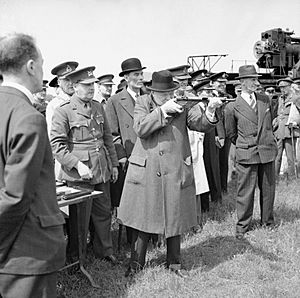
Churchill was 65 years old when he became Prime Minister, but the war seemed to give him more energy. He formed a small "war cabinet" of five key ministers. This group included Neville Chamberlain and Clement Attlee, the leader of the Labour Party. As the war went on, the cabinet grew. Churchill also created a new role for himself: Minister of Defence. This made him the most powerful wartime Prime Minister in British history.
He wanted people he trusted in his government, including friends and experts from outside politics. Churchill was proud that his government included people from across the political spectrum, from right to left. This showed a strong sense of national unity during the war.
Resolve to Fight On
In late May 1940, with British troops retreating to Dunkirk and France about to fall, some suggested trying to make peace with Germany. But Churchill was determined to fight on, even if Britain had to stand alone. He believed that if they tried to make peace, they would get worse terms than if they kept fighting.
Churchill's strong will and powerful speeches helped convince the British people to keep fighting. His words inspired the nation and prepared them for a long and hard war.
Importance of Churchill's Wartime Speeches
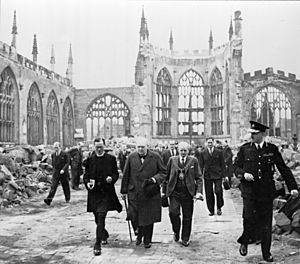
Churchill's speeches during the war were incredibly inspiring. His first speech as Prime Minister on May 13, 1940, included the famous line: "blood, toil, tears and sweat". He made it clear that the road ahead would be difficult, but victory was the only goal.
Operation Dynamo and the Battle of France
Operation Dynamo, the evacuation of over 338,000 Allied soldiers from Dunkirk, ended on June 4. This was a huge success, much more than expected. Churchill called it "a miracle of deliverance" in his "we shall fight on the beaches" speech. But he also reminded everyone that "Wars are not won by evacuations." His speech ended with a powerful message of defiance and a clear appeal for help from the United States.
Germany continued its attack, and Italy joined the war on June 10. Paris was occupied on June 14, and France surrendered on June 25. It was clear that Hitler would now try to attack Britain. On June 18, Churchill gave another famous speech, saying: "This was their finest hour". He declared that the "Battle of Britain" was about to begin and that the survival of Christian civilization depended on it.
Churchill immediately ordered counter-attacks. The Western Desert campaign began in North Africa against Italian forces. Later, in early 1941, Germany sent the Afrika Korps to help Italy, led by Erwin Rommel. Churchill also ordered the creation of the Special Operations Executive (SOE) and the Commandos to carry out secret missions and raids in Nazi-occupied Europe.
The Battle of Britain and the Blitz
On August 20, 1940, during the height of the Battle of Britain, Churchill gave a speech that created a famous nickname for the RAF fighter pilots. He said: "Never in the field of human conflict was so much owed by so many to so few." These pilots became known as "The Few".
From September 7, 1940, the German air force (Luftwaffe) began bombing London, first during the day and then at night. These raids, known as The Blitz, soon spread to other British cities like Coventry. The Blitz lasted for eight months. The Luftwaffe failed to stop British war production, which actually increased.
Churchill often watched the air raids from rooftops. He was determined to keep the government in London and used the Cabinet War Rooms underground. He remained confident during the Blitz, believing Britain could hold its own, but he knew they needed American help to win the war.
Lend-Lease
In September 1940, Britain and the United States made a deal. Fifty American destroyers were given to the Royal Navy in exchange for US base rights in British territories.
Churchill had a good relationship with US President Franklin D. Roosevelt. This helped Britain get vital food, oil, and weapons across the Atlantic. They exchanged many letters and met often. Roosevelt was re-elected in 1940 and then created the Lend-Lease program on March 11, 1941. This allowed the US to provide supplies to Britain without immediate payment, seeing it as a way to defend the US itself.
Operation Barbarossa
Germany invaded the Soviet Union on June 22, 1941. Churchill knew this attack was coming from secret messages, but Joseph Stalin, the Soviet leader, didn't trust Churchill's warnings. The night before the invasion, Churchill said that if Hitler invaded Hell, he would at least say something good about the Devil. This showed his willingness to work with anyone against Hitler.
Atlantic Charter
In August 1941, Churchill met President Roosevelt in Newfoundland. On August 14, they released the Atlantic Charter. This statement outlined their goals for the future of the world, including peace and self-determination for nations. It later inspired the creation of the United Nations.
Pearl Harbor to D-Day: December 1941 to June 1944
Pearl Harbor and United States Entry into the War
On December 7-8, 1941, Japan attacked Pearl Harbor and invaded Malaya. Churchill declared war on Japan on December 8. Three days later, Germany and Italy declared war on the United States. Churchill then went to Washington to meet Roosevelt. They decided that defeating Germany was the most important goal. They also agreed to invade French North Africa in an operation called Operation Torch.
On December 26, Churchill spoke to the US Congress. He was well-received, but he noticed that Americans were more enthusiastic about fighting Japan than Germany. Churchill suffered a mild heart attack but insisted on continuing his work. He then traveled to Ottawa to speak to the Canadian Parliament. He returned to Britain in mid-January, facing some doubts about his leadership.
Meanwhile, in North Africa, British forces pushed Rommel's army back but then Rommel launched a surprise counter-attack. In the Far East, Japan was advancing quickly.
Problems in Parliament and the War Cabinet
When Churchill returned from America, he knew that people in Parliament and the public were criticizing him. The war had been going on for almost two years, and there was no end in sight. He called for a vote of confidence in the House of Commons, which he won easily.
Churchill faced other challenges, including disagreements within his war cabinet. He brought Sir Stafford Cripps into the government, sensing his growing popularity. Churchill's spirits improved in the spring of 1942 as things settled down. He met with American leaders to discuss a cross-Channel invasion of Europe, which was planned for 1943.
Fall of Singapore and Loss of Burma
Churchill was very concerned about the quality of British troops after defeats in Norway, France, Greece, and Crete. The fall of Singapore to the Japanese on February 15, 1942, was a huge blow. He called it "the worst disaster and largest capitulation in British military history." This, along with a German naval success, made Churchill's morale sink to its lowest point of the war.
Japanese forces also advanced quickly in Burma, occupying most of the country by April 1942. Efforts to fight back were difficult. A severe cyclone and a lack of rice from Burma led to the Bengal famine of 1943. Churchill's government focused on winning the war, but he did push for aid to Bengal. He appointed Earl Wavell as Viceroy and ordered the military to transport aid, which helped ease the famine by December 1943.
International Conferences in 1942
In May 1942, the Soviet Foreign Minister, Vyacheslav Molotov, visited London to sign a friendship treaty. Molotov also wanted the Allies to open a "Second Front" in Europe to take pressure off the Soviets. Churchill could only say that preparations were underway.
In June, Churchill was with Roosevelt when he heard the news that Tobruk had fallen to the Axis forces. This was a major defeat for the Allies. Churchill helped arrange for 300 Sherman tanks and 100 howitzers to be sent from America to the British Eighth Army in North Africa.
Churchill faced another vote of no confidence in Parliament in July, but he won it. In August, despite health concerns, Churchill visited British forces in North Africa and then went to Moscow for his first meeting with Stalin. Stalin was desperate for a Second Front in Europe, but Churchill could not promise a date.
Turn of the Tide: El Alamein and Stalingrad
While in Cairo in August, Churchill made important changes to the leadership of the British forces in the Middle East. He replaced Field Marshal Auchinleck with Field Marshal Alexander, and General Montgomery took command of the Eighth Army.
As 1942 ended, the war began to turn in favor of the Allies. Key victories at the Battle of El Alamein in North Africa and the Battle of Stalingrad in the Soviet Union marked a turning point. From November onwards, the Germans were on the defensive. Churchill ordered church bells to be rung across Britain to celebrate the victory at El Alamein. On November 10, he gave another famous speech, saying:
This is not the end. It is not even the beginning of the end. But it is, perhaps, the end of the beginning.
El Alamein was a clear victory for the Eighth Army. The Americans also successfully completed Operation Torch in North Africa. The German forces were now fighting on two fronts. The Battle of Stalingrad, which lasted over five months, saw the Germans surrounded in November.
International Conferences in 1943
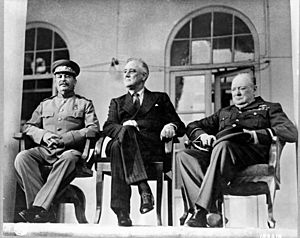
In January 1943, Churchill met Roosevelt at the Casablanca Conference. They agreed that the Allies would demand "unconditional surrender" from the Axis powers. After this, Churchill traveled to several places and then became seriously ill with pneumonia, needing a month to recover.
Churchill met Roosevelt twice more in the US in 1943, at the third Washington Conference in May and the first Quebec Conference in August. In November, Churchill and Roosevelt met Chinese Generalissimo Chiang Kai-shek at the Cairo Conference.
The most important meeting of the year was the Tehran Conference from November 28 to December 1. This was the first time Churchill, Roosevelt, and Stalin (the "Big Three") met. Stalin and Roosevelt convinced Churchill to agree to open a "second front" in western Europe with Operation Overlord (the D-Day invasion). They also agreed that Germany would be divided after the war.
On his way back from Tehran, Churchill became seriously ill again in Tunis. He recovered in Marrakesh and returned to London in January 1944. He had been away or ill for a significant part of the previous year.
Invasions of Sicily and Italy
After meeting Stalin in Moscow, Churchill convinced the Americans to invade Sicily and then Italy after defeating the Afrika Korps in North Africa. The invasion of Sicily began on July 9, 1943, and was successful.
Churchill wanted to push straight up the Italian mainland to Rome. However, the Americans wanted to move some troops to England to prepare for Operation Overlord. Events in Sicily led to King Victor Emmanuel firing Mussolini and Italy signing an armistice with the Allies. But Germany quickly took control of most of Italy. The Allies faced strong German resistance in Italy, especially at Monte Cassino. It wasn't until May 1944 that the Allies finally took Rome.
Preparations for D-Day
The difficulties in Italy made Churchill change his mind about Allied strategy. He became very involved in planning Overlord, the invasion of Normandy. He regularly held meetings with the military leaders. Churchill was especially interested in the Mulberry project, which involved building artificial harbors for the invasion. He also wanted to use the Allies' overwhelming air power. Even so, Churchill remained a bit nervous about the invasion as D-Day approached.
Need for Post-War Reform
Churchill knew that post-war reforms were needed in areas like education, health, and welfare. The Beveridge Report, which proposed a new welfare system, was published in November 1942 and was very popular. However, Churchill was mostly focused on winning the war and saw reforms as something to deal with later. His lack of interest in social reforms was clear in a radio broadcast in March 1944.
In the end, the public's desire for these reforms played a big part in the 1945 general election. The Labour Party was seen as the party that would deliver the changes proposed in the Beveridge Report.
Defeat of Germany: June 1944 to May 1945
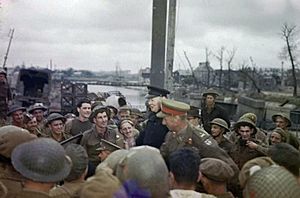
D-Day: Allied Invasion of Normandy
Churchill wanted to be actively involved in the Normandy invasion and hoped to cross the Channel on D-Day itself (June 6, 1944). However, the King stopped him, saying that as head of the armed forces, he should go too. Churchill expected many more casualties on D-Day than actually occurred. He made his first visit to Normandy on June 12. That evening, the first German V-1 flying bombs were launched against Britain.
Quebec Conference, September 1944
Churchill met Roosevelt at the Second Quebec Conference in September 1944. They discussed plans for the occupation of Germany after the war. One idea, the Morgenthau Plan, aimed to make Germany a farming country and remove its industries. However, this plan was strongly opposed by others and was eventually dropped.
Moscow Conference, October 1944
At the fourth Moscow conference in October 1944, Churchill and Anthony Eden met Stalin and Vyacheslav Molotov. They discussed the post-war future of the Balkans. Churchill suggested a way to share influence in the region, writing down percentages for each country. For example, Russia would have 90% control of Romania, and the UK and USA would have 90% control of Greece. Stalin agreed to this at the time.
Yalta Conference, February 1945
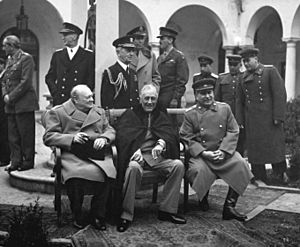
From February 4 to 11, 1945, Churchill, Roosevelt, and Stalin met at the Yalta Conference. This meeting had huge implications for the post-war world. They made good progress on setting up the United Nations Organisation. They also discussed the future of Poland, which Churchill saw as a test for Eastern Europe. Churchill faced some criticism for the agreement on Poland, but he did his best in a difficult situation, especially as Roosevelt was very ill.
VE Day and After
On May 7, 1945, Germany surrendered to the Allies. The next day, May 8, was Victory in Europe Day (VE Day). Churchill announced to the nation that the war with Germany was over. He then appeared on the balcony of Buckingham Palace with the Royal Family, waving to huge crowds. He also addressed another large crowd in Whitehall, saying:
God bless you all. This is your victory. In our long history, we have never seen a greater day than this.
He then asked Ernest Bevin, a Labour minister, to share the applause, but Bevin said, "No, Winston, this is your day." That evening, Churchill broadcast again, saying that the defeat of Japan would follow soon.
With a general election coming, and Labour ministers refusing to continue the wartime coalition, Churchill resigned as Prime Minister on May 23, 1945. He then formed a new, temporary government. The results of the 1945 election were announced on July 26. Labour won by a landslide, so Churchill resigned again and was replaced by Clement Attlee. Churchill was disappointed, but his wife, Clementine, suggested it might be "a blessing in disguise."
Images for kids
 | Selma Burke |
 | Pauline Powell Burns |
 | Frederick J. Brown |
 | Robert Blackburn |


